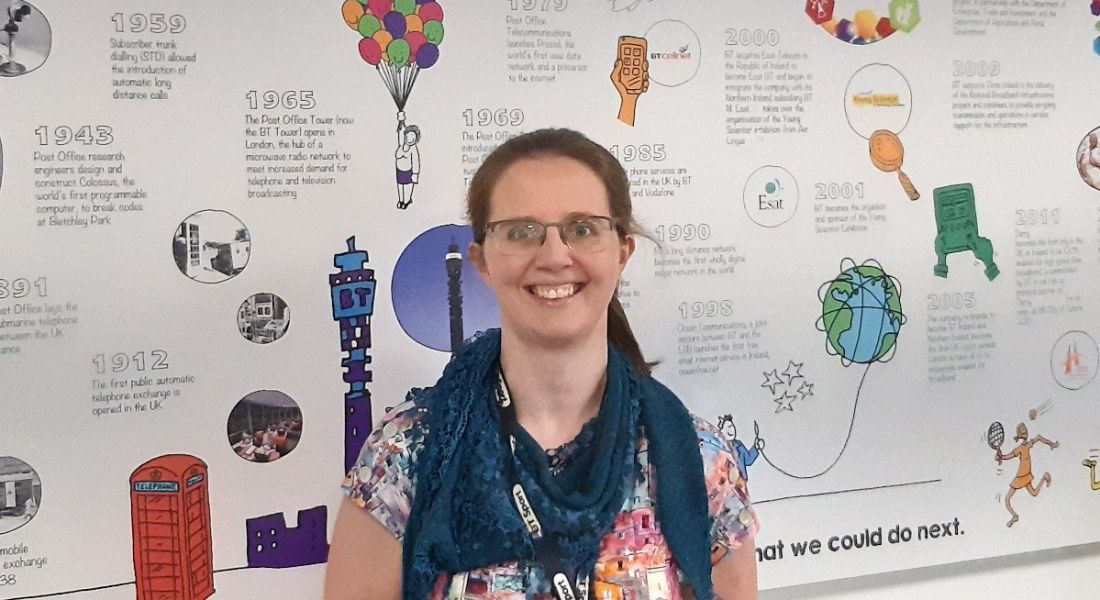BT’s Gráinne Hanley describes her role in making sure networks are running smoothly and how she deals with the sudden need to switch to incident management mode.
Gráinne Hanley is network operations centre manager at BT Ireland. She leads a team responsible for managing and governing the core networks and infrastructure of BT Ireland, with a constant focus on customer experience.
Her team provides fault troubleshooting support for Irish customers across a wide range of domestic and global network products.
Hanley joined BT Ireland in 2009 as an access performance engineer. In 2018, she took a one-year secondment as a change manager before taking up her current role in 2020.
Prior to joining the company, Hanley spent three and a half years with O2 Ireland as a network applications engineer and then as an access performance engineer. She has a bachelor’s degree in telecommunications engineering from Dublin City University and a master’s degree in computer science from University College Dublin.
‘If a network incident occurs then I must immediately switch to incident management mode’
– GRÁINNE HANLEY
If there is such a thing, can you describe a typical day in the job?
Given the nature of the job in operations, there is rarely a typical day. My team are 24/7, 365 days of the year, so my day is dependent on how the network is running operationally.
Since I work a standard working week of Monday to Friday, I start each day by getting a handover from my team about the night before and getting any necessary updates on faults or issues that I need to be aware of.
Over the course of the day, I work on escalations to get customer issues resolved, corrective action plans to mitigate against reoccurrence of any recent issues and, if required, document the root cause of any issues for customers. My day generally involves several meetings with service managers and customers as well as touchpoint meetings with other operational teams.
There are also a few governance meetings over the course of the week such as the change advisory board, where we review and approve all planned engineering works, and transfer to assurance, where we review and discuss any upcoming new products to ensure that all required technical documentation and support processes are in place to ensure the best possible experience for our customers.
A key support tool in the network operations centre (NOC) is our wallboard at the front of the room, which gives a clear visual indicator of the network health in terms of alarms, traffic levels and connectivity of our core networks across all our platforms and vendors. No two days in the NOC are the same, but that’s what keeps it interesting!
What types of project do you work on?
My team is focused on day-to-day operational stability and ensuring the performance of our core networks to the highest standard.
Therefore, the key pieces of work that I’m involved in are continuous improvement projects aimed at streamlining processes and ultimately trying to further improve the customer experience.
I find it very satisfying to support my team by trying to simplify our ways of working, addressing any bugs/issues that they encounter and ensuring that they’re kept well informed about the constant changes in terms of new products, new processes, new technologies and new customers that we support.
What skills do you use on a daily basis?
The main skills I draw on these days are statistical analysis, incident management, problem management and team coordination.
I don’t know if I fully appreciated the diversity of different people – such as field engineers, order managers, service managers, problem managers, service desk agents, project managers, etc – that I’d be dealing with on a regular basis before taking on the role.
Over time, this has really helped me to refine and better tailor my communications to suit my audience!
What are the hardest parts of engineering?
I find that in operations it’s quite hard to plan your day, as if a network incident occurs then I must immediately switch to incident management mode, jump on the incident bridge and help coordinate the investigation teams, while keeping service managers and customers informed of progress.
This means that everything else that was planned for the day simply needs to be reprioritised and rescheduled.
Do you have any productivity tips that help you through the day?
I find organisational tools such as OneNote can be very useful to keep track of all the various updates, actions and meeting minutes that I need.
I also find that having IM chats set up with various key groups can really help with easier, faster communications and group updates.
And of course, taking a short walk outdoors to grab a mid-morning takeaway coffee can really help to clear the head.
What skills and tools are you using to communicate daily with your colleagues?
The last couple of years under Covid-19 has really increased the diversity of communication methods that I use in the workplace.
From WhatsApp for quick check-ins with people, IM, Teams meetings and shared online files to email for more formal comms.
Also, since my team works a 24/7 shift pattern, I maintain an online Teams page to keep my team informed of all challenges, changes, focus areas and recognition that they can dip into no matter what time of day or night they want to catch up on goings on.
How has this role changed as the engineering sector has grown and evolved?
The core network is constantly changing, evolving and diversifying as new technologies are rolled out and old ones are retired.
With each change, there comes the need for more upskilling and growth. Both in my current and previous roles, I’ve seen some fantastic steps forward in technology and so the challenge is to always try to stay inquisitive about what’s coming next.
What do you enjoy most about working as an engineer?
I like when we get to the root of an issue and figure out how to fix it!
What advice would you give to someone who wants to work in engineering?
You need to be someone who enjoys change and who is always inquisitive, but it’s a great career and you’ll rarely be bored!
10 things you need to know direct to your inbox every weekday. Sign up for the Daily Brief, Silicon Republic’s digest of essential sci-tech news.




